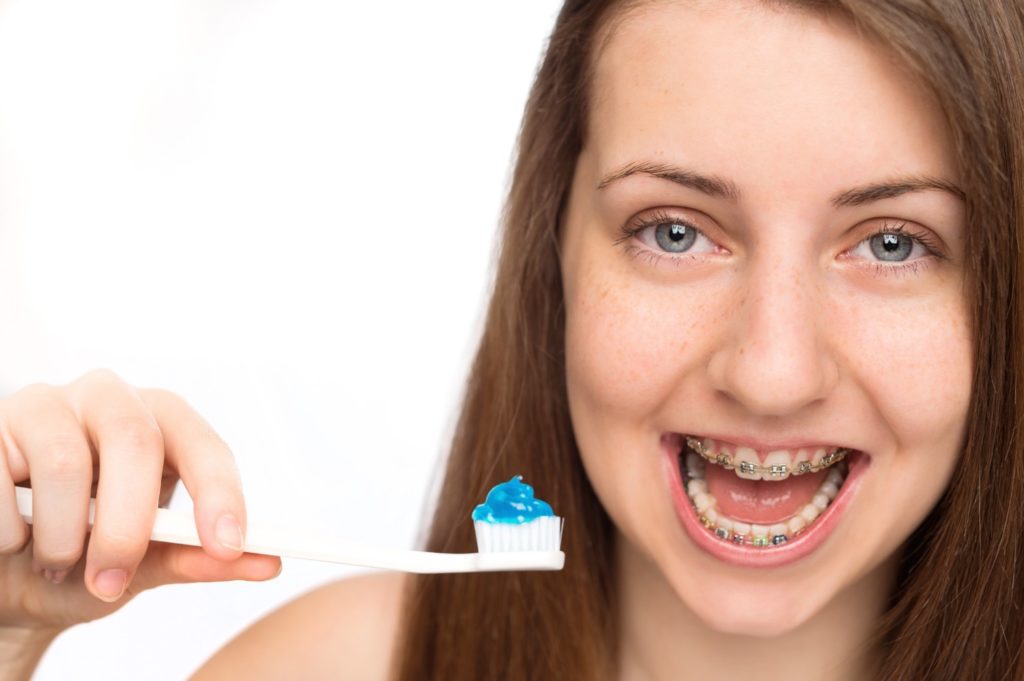Have you been experiencing tooth sensitivity? This problem is often triggered by hot or cold temperatures, sweet or sour foods and drinks, and deep cavities or fillings. An estimated 45 million Americans are victims of tooth sensitivity, which means this a very common dilemma! Sensitivity is also not at all uncommon while undergoing orthodontic treatment.
When the enamel on the outside of the tooth wears away exposing the dentin layer of the tooth, the tooth or teeth becomes sensitive. The dentin layer is very porous with tubes that run to the nerve center. The tubes react to changes in temperature and different foods when they get exposed.
The discomfort a patient undergoing orthodontic treatment experiences is due to pressure that is placed on your teeth by the braces. This level of discomfort varies from patient to patient. The sensitivity will only last a few days and is in no way permanent. At Dillehay Orthodontics, we educate our patients on how to reduce this sensitivity to enhance a more pleasant orthodontic treatment experience. Below are some common causes of tooth sensitivity, whether you are wearing braces or not.
The Most Common Causes of Tooth Sensitivity
- Over brushing is the most common cause of tooth sensitivity. You will soon brush away your gum line if you brush your teeth too vigorously with tough bristles. Porous root surfaces are exposed as your gum line recedes, which may cause some of your teeth to become extremely sensitive. Gum recession occurs over time in older patients as a result of the natural aging process. Brushing with a soft brush in an up and down motion, as opposed to horizontally, can help reduce your risk of developing sensitive teeth.
- Beware of acidic foods such as soft drinks, fruit drinks, wine, coffee, and sour citrus fruits and candy— especially Sour Patch Kids and Jolly Ranchers! Rinse your mouth with water right after having acidic foods or drinks to dilute the acid.
- Brushing more than three times a day and abrasive toothpastes may cause loss of enamel. Wait for at least one hour after you have had acidic foods or drinks to brush your teeth. Acid leaves the enamel softened and more prone to erosion during brushing.
- The tooth nerve can be irritated by teeth whitening products, both at home and professionally applied by your dentist. One of the main ingredients in most tooth whitening products is peroxide, which has been shown to cause irritation or inflammation, with symptoms like cold sensitivity and a tingling sensation.
- Another contributing factor to sensitivity is the grinding of teeth. To help prevent the wearing down of enamel, try wearing a mouthguard at night while you sleep.

How to Eliminate Discomfort
A good dental routine is your best bet to enjoying a pain-free day everyday, no matter what is causing the problem. Over-the-counter toothpastes like Sensodyne and Colgate’s Sensitive Pro-Relief, which are specially made for sensitive teeth, can sometimes help treat the condition.
More invasive treatments provided by a dental care professional may be needed if patients do not experience relief from special toothpastes. Sensitivity will improve if a bonding agent is added to seal the tooth, or in the case of receding gums new gum tissue will need to be grafted on.
Before the Braces
The pre-existence of tooth sensitivity can be an enormous concern for those contemplating braces. Braces put pressure on the teeth and gums — which may exacerbate any pain or existing sensitivity— but they have to in order to effectively shift the teeth and obtain a perfect smile. Fortunately, this type of sensitivity is a short lived result, occurring only as teeth and gums begin to accommodate the adjustment process.
While it is normal for braces to cause some minor tooth sensitivity, they should not result in extreme or ongoing discomfort. If your teeth feel particularly sensitive while wearing braces, it is likely to be caused by one of the reasons outlined above.
Invisalign is a great alternative for people who suffer extreme tooth sensitivity. It is a removable system that uses a series of medical-grade plastic aligners to gradually shift the teeth over time. Because there is less opportunity for mouth irritation and the development of bacteria that can often occur through exposure to the metal wires, brackets, and bands of traditional braces, Invisalign patients are able to maintain much better tooth hygiene. This ultimately reduces the likelihood of tooth sensitivity caused by braces.

Imperfections like tooth overcrowding, crooked teeth, and overbites can possibly lead to tooth sensitivity, too. Many patients notice significant improvement over time by correcting these issues with orthodontic treatments like Invisalign or traditional braces. For this reason, having braces might work out to be the best long term solution for tooth sensitivity.
Braces are no longer the hindrance on life that they were once thought to be. The impact that braces formerly had on lifestyle or comfort have been reduced by modern orthodontics, better technology, and new treatment options like Invisalign. It is important to remember that the level of soreness or irritation you might feel while wearing any form of braces is only a short term inconvenience.
Your teeth will become stronger and less prone to sensitivity by fixing your orthodontic issues now, and give you one more reason to show off your beautiful new smile. If you have questions about how Invisalign works with sensitive teeth, other treatment options available that minimise the discomfort caused by orthodontic problems, or if you are a patient who has noticed extreme sensitivity— definitely come in and discuss it with Dr. J.K. Dillehay or Dr. Ken Dillehay. They can recommend alternative solutions during your treatment, no matter what the cause. At Dillehay Orthodontics we are always here to help!
